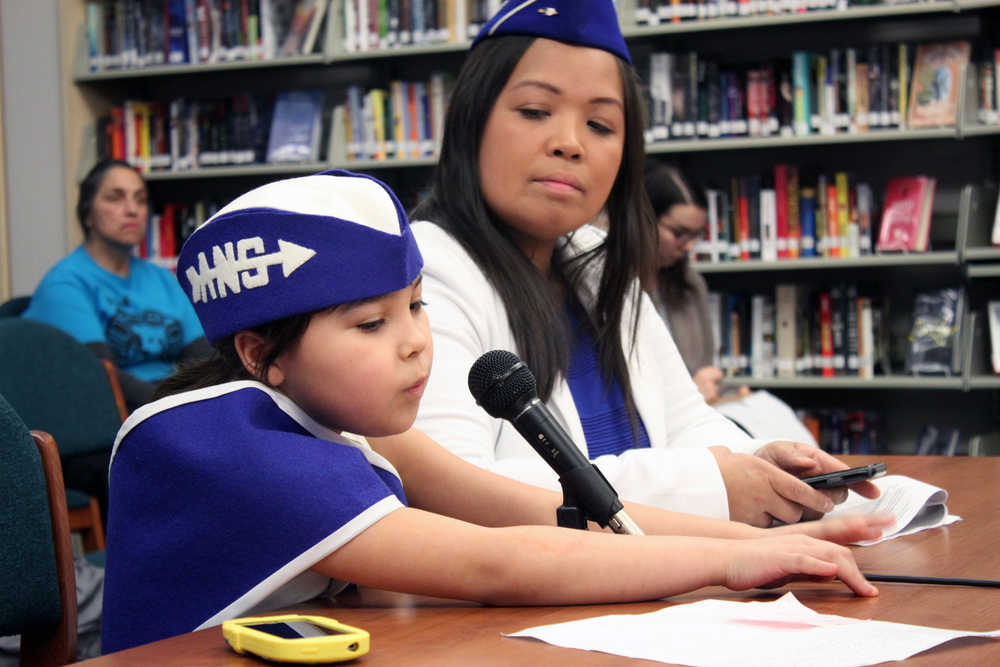The Juneau School Board didn’t make any budget changes directly related to the Tlingit Culture, Language & Literacy program despite public outcry from the community to make it a higher funding priority.
“It was in the schools where we lost our language, where it was taken from us, and in pretty horrific ways. It’s ironic that today that’s where we’re getting our languages back and TCLL is a very powerful program,” said Richard Peterson, president of Central Council of the Tlingit and Haida Indian Tribes of Alaska.
“We urge the school board to prioritize the Native language program not as an add-back to the Juneau School District budget but rather to have the TCLL program be part of the zero-based budget,” said Juneau Tlingit and Haida Community Council President Janice Hotch, as other council members stood behind her.
Hotch and Peterson were just two of about 20 people, including two children, who testified at Tuesday night’s school board meeting in support of the TCLL, an optional district program located in Harborview Elementary School.
After the district’s $60 million basic budget, or zero-based budget, the board has 69 add-back items placed in three different priority levels.
Items in the first level would get added back if the Alaska Legislature passes a Base Student Allocation of $5,880, which is the current year’s level. Items in the second level would get added back if the Legislature passes a BSA of $5,930, as planned in an education reform package passed in 2014. Items in the third funding level would be added back if the BSA is any more than that.
Salaries for the three classroom teachers of the TCLL program are already included in the basic budget. Two support teachers — a Tlingit language instructor and a reading intervention specialist — are in the first priority level. The program’s cultural education paraeducator, who is shared with Harborview, is in the second level.
Director of Teaching and Learning Ted Wilson said the language instruction is “part of the identity of the program.”
Many members of the public who testified took issue with where the TCLL support teachers fell on the list — 19th of 21 items in the first priority level.
“Some people in the public have looked at the number as something very intentional on our part. And I think the intentionality is the categories, not the specific number,” said board president Brian Holst.
He said the board would revisit ranking the items if the funding level necessitated it.
Board member Lisa Worl said how the items are ranked is relevant to her. Worl is half Tlingit, half Filipino.
“I’m the face of that population that is affected by this,” she said.
The items were ranked based on a point system — board members were each given a pool of points and could distribute them based on importance.
“I know where I put mine and I did it strategically because I didn’t feel there was much support for the equity programs,” Worl said.
Worl recounted growing up in Juneau schools. “I thought of the teachers I had, who were not inherently bad but they lacked cultural sensitivity and training, and did not reach out to students like myself,” she said.
Worl said it was a cultural paraeducator who made a difference in her life when she was a student and encouraged her to attend leadership conferences.
There were a few amendments to get the cultural education paraeducators into the first priority level, a $260,914 line item. The district currently has 8.5 that work in all grade levels throughout the district, and could lose 3.5 next year.
Board members Emil Mackey and Andi Story had amendments that proposed swapping them for part or all of the activities directors, a $149,528 line item.
Superintendent Mark Miller said the district couldn’t run activities without directors.
“You’re talking about pulling the whole fabric away from what keeps a lot of kids in school,” said board member Sean O’Brien.
Worl added, “One way to suddenly create a lot of animosity instead of support for equity programs is to pit it against one of the most popular programs ever.”
Those amendments didn’t go anywhere. The only amendment that stuck was moving the middle school Native success support — a $35,333 line item — and $7,000 of the drug testing program up from the second priority level to the first. That will be paid for with $42,000 of “cushion” funding between the first and second funding levels, according to Director of Administrative Services Director David Means.
In other district business, the school board approved another one-year contract for the Juneau Community Charter School. Its current enrollment is a low 74 students. The contract states that the school will aim to enroll between 80 and 100. At this time, the district’s budget allocation for the charter school next year is $1,194,023 based on a projected enrollment of 85 students.
• Contact reporter Lisa Phu at 523-2246 or lisa.phu@juneauempire.com.

